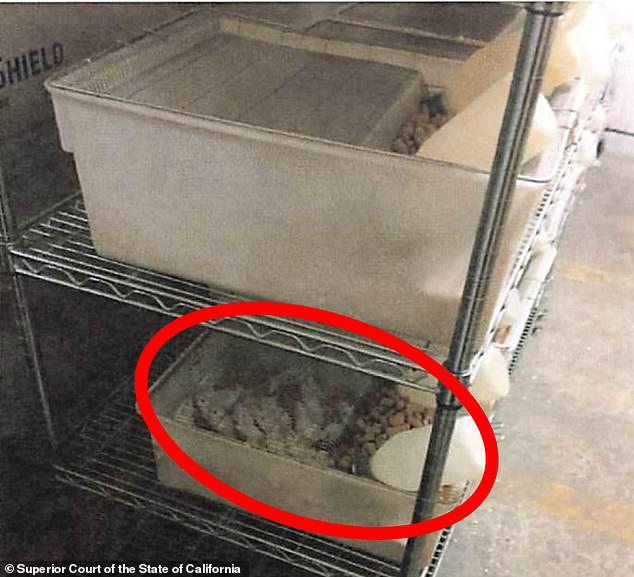
These are the shocking photos taken by investigators during the bust of an illegal biolab in a sleepy California town.
Fresno County officials raided the unassuming warehouse in Reedley – home to just over 25,000 residents – where they discovered a lab of horrors with suspicious links to China.
Photos show dead mice stuffed in storage bins haphazardly shoved on shelves and freezers filled to the brim with bottles of blood and plasma of origins unknown.
Images also show samples of infectious agents, including a box labeled ‘malaria’ alongside indecipherable Chinese writing.
Unanswered questions remain about the origins of the lab, who was running it, and what they were up to.
In total, investigators found 1,000 dead, dying, and disease riddled mice, as well as vials of disease-causing pathogens including Covid-19, tuberculosis, HIV, herpes, and dengue fever.

Nearly 1,000 mistreated and malnourished white lab mice were discovered at the facility in subpar conditions. About 200 of them were already dead. The rest have been humanely euthanized by a veterinarian
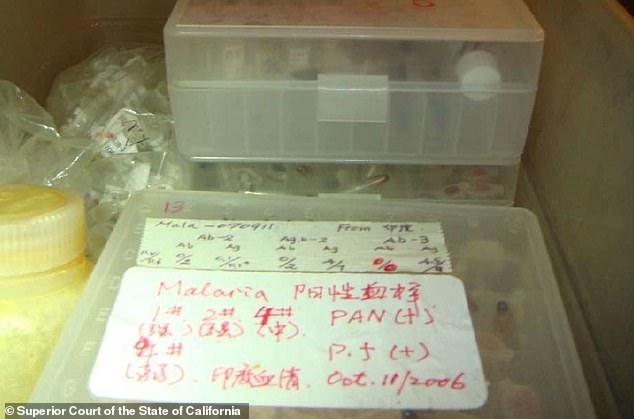



Among hundreds of vials of infectious viruses and bacteria, many of which were stored improperly in shoddy freezers, were samples of malaria, shown here, alongside Chinese characters. Other infectious agents found included strains of the herpes virus, the bacterium that causes meningitis, chlamydia, Covid-19, and HIV
The photos were included in unsealed court documents detailing the extent of the dangerous conditions inside the unassuming warehouse in Reedley, California, including evidence that deceased animals were thrown out with the trash, according to code enforcement officer Jesalyn Harper.
Court documents have revealed the squalid conditions in which lab mice lived and the haphazard storage of infectious diseases at a now-shuttered illicit chemical lab in a sleepy California town still grasping to understand how it came to be.
Nearly 1,000 white mice were crowded into storage containers under bright lights 24 hours a day, seven days a week in an airless room on perpetually dirty bedding.
When pressed for more information about living conditions in the unlicensed lab, its dubious path for certification, and risky storage methods and waste disposal, city and county officials were met with vague responses from occupants of the building that failed to offer satisfactory answers.
Reedley city officials, alongside Fresno county and federal government investigators, have said the stored viruses and bacteria have been properly discarded and the distressed mice humanely euthanized, but the number of questions about the purpose of the illicit lab and the people behind it outnumbers the answers.
County officials have so far removed more than 5,000 gallons of biological waste from the site over three separate trips to the warehouse earlier this month, a major step since the lab was first identified in December 2022.
Ms Harper said: ‘There are regulations and standards for keeping mice. You are not meeting these standards at a state or local level. You have yet to provide us with the UMI procedures that would outline your care plan for these mice.’
County officials also brought in a veterinarian to assess the health of the mice and concluded that ‘there is great concern for the way the mice are being kept and cared for.’ And water to the building had been shut off, leaving few if any sources of drinking water for the mice.
In May, staff from the Centers for Disease Control found hundreds of vials of infectious viruses and bacteria in the lab. Those that were labeled included the bacterium that causes chlamydia, E. coli, the bacteria that causes tuberculosis and meningitis, those that cause pneumonia, and an infectious parasite called Toxoplasma gondii.
Among the viruses that were labeled, inspectors found hepatitis B and C, dengue, HIV, two strains of the herpes virus, respiratory syncytial virus (RSV), rubella, coronavirus, and malaria.
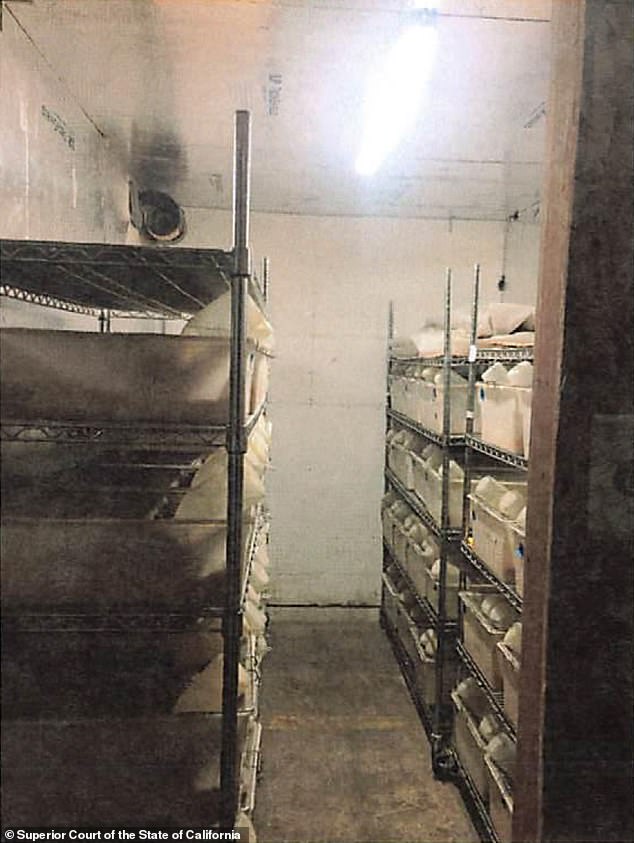





The mice were confined to a poorly ventilated room hardly larger than a closet under constant bright lights shown in the above photo. Court documents also say they lacked adequate food and water
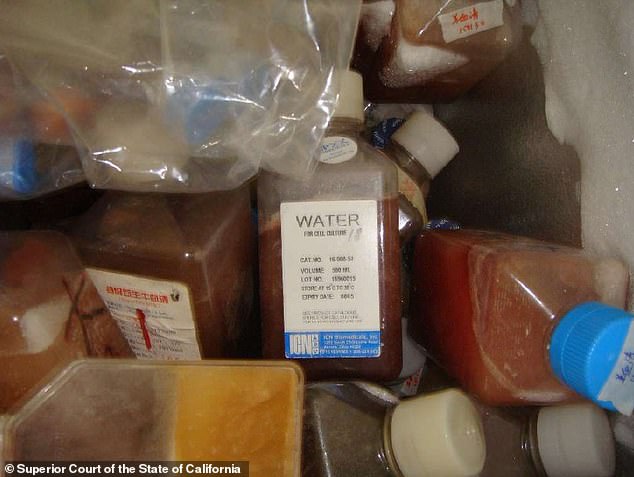





Investigators also found containers of plasma and blood of unknown origin and for unknown purposes
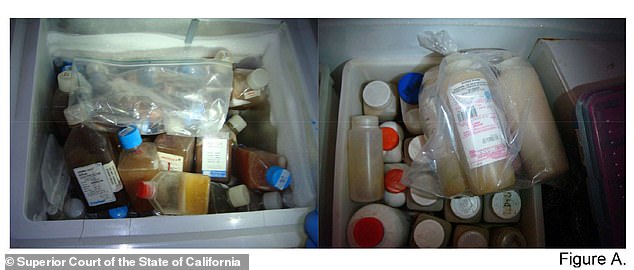





Several of the 32 freezers containing biological materials and dangerous pathogens that were found were malfunctioning, as power had been cut to the building
Despite what they found, a representative of the company behind the lab named David He reportedly disputed Fresno County officials ‘that infectious agets were kept on the property.’
An official added in a request for a warrant to go in and dispose of the lab’s contents: ‘On June 8, 2023, I responded to David He’s June 7, 2023, email and provided a list of all identified infectious agents found on the Property.
‘Mr He’s purported lack of knowledge of infectious agents on the Property raise serious concerns with the lack of safety protocols and direction offered by Prestige Biotech and other business entities handling of these infectious agents as a serious threat to public health and safety.’
For example, court documents say, a mosquito could feed on the samples of tissue or blood exposed to malaria stored on the property, becoming a disease vector to spread the disease in humans.
Mr He further denied any and all arguments that the storage posed a threat to public health and only admitted to having samples of E. Coli and nothing else.
And the county officials were skeptical from the start about Mr He’s legitimate affiliation with Prestige Biotech, noting that he provided no satisfactory documentation to the county’s public health department that he was an authorized agent of the firm or its predecessor, Universal Meditech Inc. So far, the forces behind the lab remain shrouded in mystery.
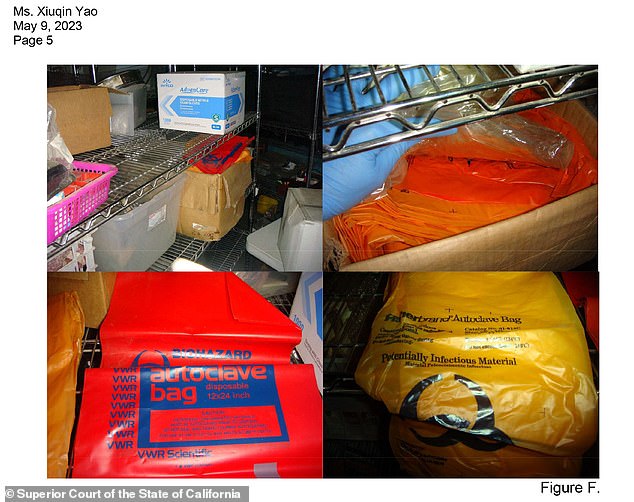





Investigators found several unmarked biohazard bags including an orange biohazard bag that is not permissible for containment of medical waste in California
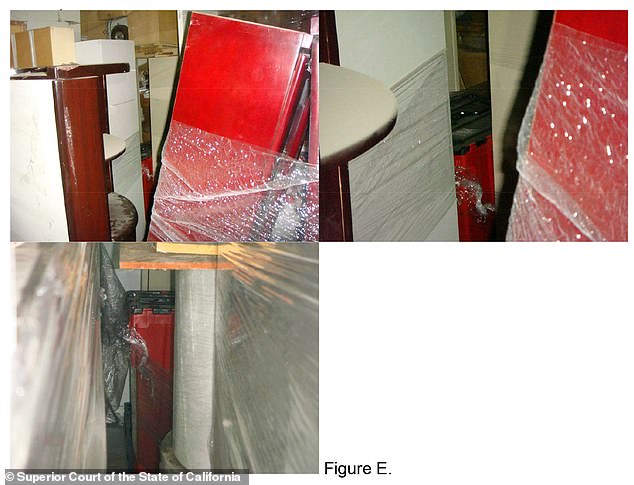





Investigators also found a biohazardous waste container, one example of the facility’s improper disposal practices, having been shrinkwrapped and stored next to filing cabinets. The contents are unknown, as investigators deemed it unsafe to inspect further, but it violated municipal waste management requirements
The county official said: ‘Fresno County Public Health staff has made repeated attempts to request the identities and contact information for the principals and/or authorized agents of Prestige Biotech and UMI. These attempts have thus far been futile.’
Mr He also offered information that county officials maintain ‘failed to communicate and identify a representative for Prestige Biotech or UMI authorized to do business in California.’ For instance, Xiaoxiao Wang was named as the agent from UMI that assumed financial responsibility for the business in Reedley and the address that was provided was in Fresno.
But that address ended up being the same address where UMI operated its previous unlicensed laboratory before hastily transferring all biologicals, equipment, and mice to the Reedley facility after the owner of the property threatened eviction.
And while the precise origins of the lab remain unknown, county officials noted that the other addresses provided were empty offices in China or other addresses in that country that could not be verified.
The story began with a city official passing by the unassuming warehouse on I street in Reedley and spotting a garden hose protruding from the building where it should not have been.
The eagle-eyed code enforcement officer set off a domino effect of shocking revelations about the operation there.
In March earlier this year, among hundreds of vials of dangerous viruses and bacteria along with shelves of dead and distressed mice lacking food and water, investigators also found over 30 freezers containing biological materials, some of which ‘had either stopped functioning or were failing due to an inadequate power supply.
Currently, the investigation into the provenance of the lab is ongoing. While biological materials have been removed, power to the facility has been cut, and lab workers have cleared out, the shoddy equipment remains.
Reedley City Manager Nicole Zieba told reporters: ‘There are no more biologicals. There are no more mice, but they still will see us abating 30 freezers and fridges, medical equipment, and all sorts of furniture in there. They’ll still see some activity nothing hazardous at this point.
‘Some of our federal partners still have active investigations going I can only speak to the building side of it.’
Source: | This article originally belongs to Dailymail.co.uk